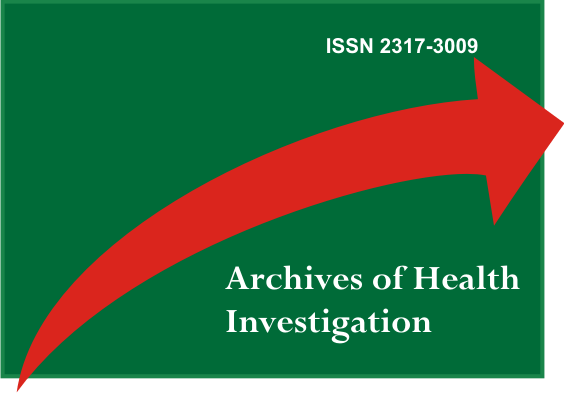O cuidador de paciente com neoplasia cerebral maligna primária: os desafios do cuidado
Resumo
Pacientes com neoplasias cerebrais malignas primárias sofrem várias perdas de funções cognitivas e motoras, sendo necessária a presença de um cuidador que cada vez mais tenha de dedicar seu tempo para conseguir dar o suporte necessário. Geralmente, esta função é assumida por membro da família, com atividades que incluem higiene pessoal do paciente, acompanhá-lo nas consultas médicas e lidar com finanças, o que acaba sobrecarregando-o física e psicologicamente. Assim sendo, esta revisão de literatura pretende analisar os impactos que o papel de cuidador de paciente adulto com neoplasia cerebral maligna primária pode causar na qualidade de vida daquele que o assume, as complicações do cuidado, demandas dos cuidadores e convívio com paciente que está na fase terminal da doença. Foram pesquisados em bases de dados artigos que tratassem de cuidadores familiares de pacientes adultos com neoplasia cerebral maligna primária. O estudo permitiu concluir que ser cuidador deste tipo de paciente tem consequências na qualidade de vida daquele que se encarrega desta função, com estresse, perdas de sono e problemas financeiros. Suas necessidades incluem: ter alguém para conversar sobre o assunto, participar de programas de redução do estresse e ter informações sobre a doença. Em fases avançadas da doença, o paciente tem sério comprometimento motor, afasia e convulsões frequentes, o que acaba levando o cuidador ao esgotamento. Observa-se que o nível de qualidade de vida costuma ser abaixo do encontrado em cuidadores de outros tipos de cânceres, portanto é um grupo que precisa de maior atenção, principalmente dos profissionais de saúde.Descritores: Neoplasias Encefálicas; Cuidadores; Qualidade de Vida.
Downloads
Referências
Instituto Nacional do Câncer José Alencar Gomes da Silva (INCA). Estimativa 2014: Incidência de Câncer no Brasil. Rio de Janeiro (Brasil): INCA, 2014. p. 46-47.
Tastan S, Kose G, Iyigun E, Ayhan H, Coskun H, Hatipoglu S. Experiences of the relatives of patients undergoing cranial surgery for a brain tumor: a descriptive qualitative study. J Neurosci Nurs. 2011;43:77-84.
Hricik A, Donovan H, Bradley SE, Given BA, Bender CM, Newberry A et al. Changes in caregiver perceptions over time in response to providing care for a loved one with a primary malignant brain tumor. Oncol Nurs Forum. 2011;38(2):149-55.
Schubart JR, Kinzie MB, Farace E. Caring for the brain tumor patient: family caregiver burden and unmet needs. Neuro Oncol. 2008;10(1):61-72.
Goebel S, Von Harscher M, Mehdorn HM. Comorbid mental disorders and psychosocial distress in patients with brain tumours and their spouses in the early treatment phase. Support Care Cancer. 2011;19(11):1797-805.
Lipsman N, Skanda A, Kimmelman J, Bernstein M. The attitudes of brain cancer patients and their caregivers towards death and dying: a qualitative study. BMC Palliat Care. 2007; 6:7.
Janda M, Steginga S, Dunn J, Langbecker D, Walker D, Eakin E. Unmet supportive care needs and interest in services among patients with a brain tumour and their carers. Patient Educ Couns. 2008;71(2):251-8.
Finocchiaro CY, Petruzzi A, Lamperti E, Botturi A, Gaviani P, Silvani A et al. The burden of brain tumor: a single-institution study on psychologica patterns in caregivers. J Neurooncol. 2012;107(1):175-81.
Ownsworth T, Henderson L, Chambers SK. Social support buffers the impact of functional impairments on caregiver psychological well-being in the context of brain tumor and other cancers. Psychooncology. 2010;19(10):1116-22.
Newberry A, Kuo J, Donovan H, Given B, Given CW, Schulz R et al. Identifying family members who are likely to perceive benefits from providing care to a person with a primary malignant brain tumor. Oncol Nurs Forum. 2012;39(3):E226-E232.
Arber A, Hutson N, de Vries K, Guerrero D. Finding the right kind of support: a study of carers of those with a primary malignant brain. Eur J Oncol Nurs. 2013;17(1):52-8.
Flechl B, Ackerl M, Sax C, Oberndorfer S, Calabek B, Sizoo E et al. The caregivers' perspective on the end-of-life phase of glioblastoma patients. J Neurooncol. 2013;112(3):403-11.
Janda M, Steginga S, Langbecker D, Dunn J, Walker D, Eakin E. Quality of life among patients with a brain tumor and their carers. J Psychosom Res. 2007;63(6):617-23.
Sizoo EM, Braam L, Postma TJ, Pasman HR, Heimans JJ, Klein M et al. Symptoms and problems in the end-of-life phase of high-grade glioma patients. Neuro Oncol. 2010;12(11):1162-6.
Cavers D, Hacking B, Erridge SE, Kendall M, Morris PG, Murray SA. Social, psychological and existential well-being in patients with glioma and their caregivers: a qualitative study. CMAJ. 2012;184(7):E373-E382.
Swartz JJ, Keir ST. Program preferences to reduce stress in caregivers of patients with brain tumours. Clin J of Oncol Nurs. 2007;11(5):723-7.
Parvataneni R, Polley MY, Freeman T, Lamborn K, Prados M, Butowski N et al. Identifying the needs of brain tumor patients and their caregivers. J Neurooncol. 2011;104(3):737-44.
Boele FW, Heimans JJ, Aaronson NK, Taphoorn MJ, Postma TJ, Reijneveld JC et al. Health-related quality of life of significant others of patients with malignant CNS versus non-CNS tumors: a comparative. J Neurooncol. 2013;115(1):87-94.
Pawl JD, Lee SY, Clark PC, Sherwood PR. Sleep loss and its effects on health of family caregivers of individuals with primary malignant brain tumours. Res Nurs Health. 2013;33(3):386-99.
Instituto Nacional do Câncer (INCA). Câncer no Brasil: dados dos registros de base populacional. Rio de Janeiro: INCA, 2010. v. 4. p. 466-467.
Keir ST, Guill AB, Carter KE, Boole LC, Gonzales L, Friedman HS. Differential level of stress in caregivers of brain tumor patients - observations from a pilot study. Support Care Cancer. 2006;14(12):1258-61.
Madsen K, Poulsen HS. Needs for everyday life support for brain tumour patients' relatives: systematic literature review. Eur J Cancer Care. 2011;20(1):33-43.
Ohnsorge K, Keller HR, Widdershoven GA, Rehmann-Sutter C. "Ambivalence" at the end of life: how to understand patients' wishes ethically. Nurs Ethics. 2012;19(5):629-41.


